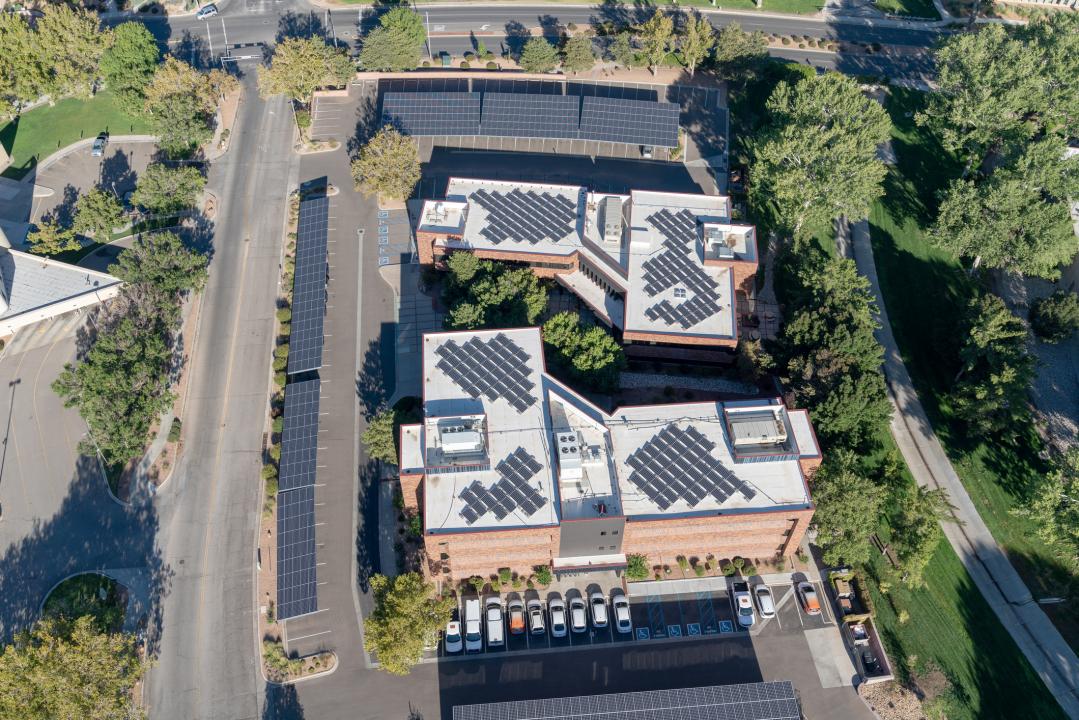As Europe’s largest employer, the NHS accounts for around 4% of the UK’s carbon emissions. However, over the last decade, it has reduced emissions by nearly a fifth, and is currently working towards an 80% reduction between 2028 and 2032, with the target of being net zero by 2040.
In its ‘Delivering a Net Zero National Health Service’ report, published in October 2020, NHS England recommended that ‘better use of roofs and adjacent ground space will support a shift to on-site renewable energy and heat generation across the estate’.
That is why, in its new guide - ‘Plot Your Path to Net Zero: A Focus on Solar PV for the NHS’ - nbs takes a closer look at solar PV, and the benefits it can bring to organisations that are keen to consider on-site generation as part of their decarbonisation strategies. From lowering carbon emissions, achieving net zero and climate change objectives, to reducing reliance on the grid, the benefits of solar PV are clear.
As part of this, we surveyed 50 organisations from across the NHS and healthcare sector, to find out whether they have already invested, or would consider investing, in a solar asset. We also explored any barriers they are facing when securing buy-in for a project.

The results showed that organisations overwhelmingly recognise the benefits of solar PV, but also highlighted some of the challenges they face when it comes to convincing their board that it is the next logical step to take when it comes to their net zero plans. In fact, 90% of our respondents agreed or strongly agreed that solar PV provides the easiest and most cost effective way for organisations to make the switch to renewable energy.
With that in mind, here we outline our three key steps to solar PV success for the NHS and healthcare sector.
Assess site suitability
As mentioned earlier, some of the best sites for solar are where there is a large south-facing roof space, so hospitals and large office buildings are ideal.
However, it is important to note that solar PV isn’t just for roofs. Organisations that have premises with a large area or adjacent land or car parks can also look to install ground-mounted solar and solar canopies to generate energy for their site. There are also innovations and newer technologies such as floating solar, which can be an option if you have a body of water on your site.
That said, there is one word of caution - some sites may have great potential, but if there is not enough grid availability - which can be determined by working with the local Distribution Network Operator (DNO) - it can stop a project before it starts. We can support you on assessing the feasibility of your site for a solar project.
Build the case for investment
The benefits of solar are clear. It reduces costs, lowers carbon emissions, improves reputation and allows organisations to be more self-sufficient and less reliant on the grid. That said, securing internal buy-in and getting the board ‘on board’ can be one of the key barriers to securing the go ahead for a project.
Here, the message is clear - keep it simple and demonstrate a clear return on investment (ROI), for example,‘if you invest X, you will save Y’. Backing this up with similar success stories will also help to build the case for investment.
That said, there doesn’t need to be an upfront investment if CAPEX is limited. In fact, around 80% of projects we are working on are via a Power Purchase Agreement (PPA), which involves no initial capital outlay. This can help allay any financial concerns.
Work with an expert partner
Our survey showed that while organisations were keen to explore solar PV, a third (32%) said they didn’t have a full understanding of how installing a system could benefit their organisation. This can also apply to funding models - we have found that many don’t realise that there are multiple and flexible ways to fund a project, depending on the specific requirements.
That is why it is important to work with an expert partner who can help you make the right decisions and build the case for solar PV.
The report - ‘Plot Your Path to Net Zero: A Focus on Solar PV for the NHS’ - can be downloaded here by selecting the solar tile. You can also find out more in our latest webinar - watch on demand here.



















